Heralds: Diplomats, Referees, and the Ultimate Power on the Battlefield
If you’ve ever watched a royal ceremony on television, been to a medieval fair, or watched a film set in the medieval ages you’ve probably seen a herald busy at work. These brightly dressed men started out as early diplomats and scholarly nobility, but quickly evolved into something very different. More than mere referees of battles and tournaments, they were actually the most powerful men on the battlefield, with the power to decide who won and lost decisive battles throughout history.
The Rise of the Herald: Early Heralds
The earliest heralds were an early form of diplomat. It was their duty to deliver proclamations and act as messengers for monarchs and noblemen. Much like diplomats today, heralds received a kind of diplomatic immunity.
Heralds carried a white rod that told enemy combatants that they were not to be attacked or punished for the contents they carried. Essentially, the herald was holding up a sign that said ‘don’t shoot the messenger’. Without this immunity, a herald’s job would have been impossible.
- After Life-Long Search, Detective Finds Lost Chief of Scottish Clan: ‘The Buchanan’ is its First Chief in 337 Years
- How the Welsh Flag Became the Coolest Flag in the World
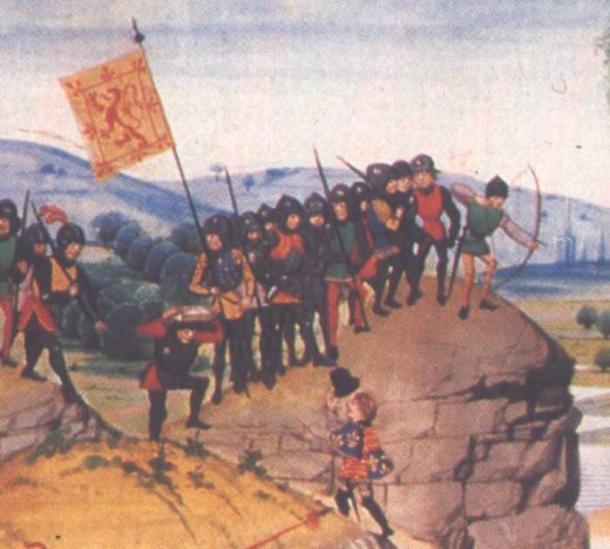
‘Is that a lion on your flag? I’ve got a message for you!’ An English herald approaches Scottish soldiers, artist unknown. (Public Domain)
Over time, their immunity and repeated interactions with the monarchy and noblemen meant that heralds became experts in heraldry (the study of knights and the nobility). This meant they knew all the different badges, standards, and coats of arms, and who they represented. A herald needed to know this information to ensure they delivered messages to the right person.
Since most of these symbols were hereditary, heralds soon became experts in the genealogies of the different noble houses. Furthermore, since these family crests were often intricately tied to the family's histories, heralds also became experts in the histories of the different houses and nobilities.
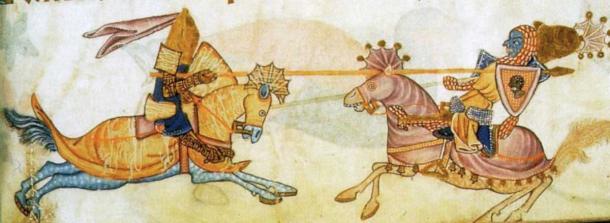
Heralds were respected officials on heraldry. Their knowledge was necessary to decipher who is in this drawing of two knights jousting. A Saracen bearing a Moor's head as his arms is unseated by a knight in the royal arms of England (gules, three lions passant guardant). A man bearing the royal arms, without 'labels' or other heraldic distinctions, unambiguously indicates a king of England. The only English king to take part in a Crusade to the Holy Land while king was Richard I. (Public Domain)
Over time, the role of heralds began to change. Rather than messengers or diplomats, they began to police the heraldry. If there was a dispute over which family a crest belonged to, it was the heralds who made the verdict.
- The Encoded Crusader Sword: Can You Solve the Cryptic Code?
- Location of King Henry VIII’s Dramatic Jousting Fall Found
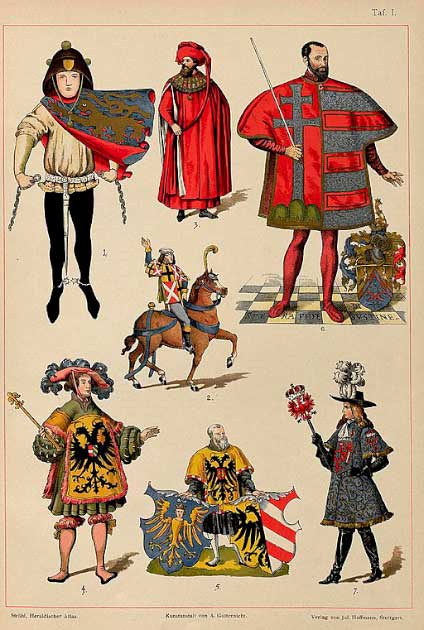
The varied appearance of heralds from different nations, from Hugo Gerhard Ströhl’s "Heraldischer Atlas", 1899 (Public Domain)
Heralds at Tournaments
As tournaments became more popular during the medieval period, the heralds were chosen to organize them. Only the nobility could take part, and the heralds had all the knowledge necessary to ensure only those who qualified competed. The action in these tournaments could also become quite frantic, and the heralds were the only ones with the depth of knowledge necessary to keep track of who won and lost.
The early tournaments weren’t like jousting competitions as we think of them today. They were massive war games, where the goal was to capture the other side's knights. If you captured an opposing knight, you could either keep their horse for yourself or collect a ransom from the knight's family. The tournaments were big business. Knights were fighting for real money, and the best became incredibly rich.
Heralds needed a good eye. These events sprawled over miles and miles of countryside and could swallow up entire towns. Contestants could number into the hundreds and it was down to the heralds to keep track of who was who and which side they represented.
As war games, these tournaments could be incredibly dangerous, and it wasn’t uncommon for knights to lose their lives. Not only did heralds need to keep track of who was winning, but also who was dying and how. In the chaos of the games, it was important that deaths and injuries were not miscommunicated.
As these events became more popular, they came with increasingly high levels of pageantry. They would often be held at times of religious significance, like Christmas and Easter feasts, and would involve large ceremonies. Heralds were involved in the organizing of these large events, making sure everyone who should be involved was involved.
As time moved on, the tournaments remained popular but decreased in size, becoming more akin to modern sporting events. By the Tudor period, they had evolved into the kind of jousting contests we most often see depicted today.
As the tournaments became smaller, the heralds played an increasingly large role in the organization of the ceremonies that surrounded them. Today, heralds in the United Kingdom still play this role. They take part in important ceremonies, like coronations, state funerals, and the opening of parliament.
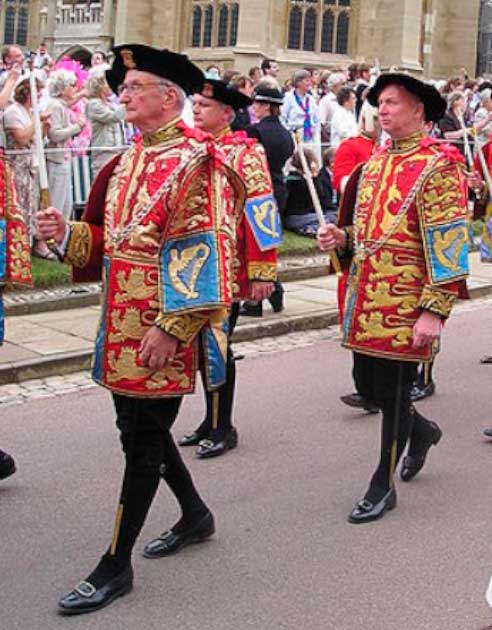
Heralds in procession to St George's Chapel, Windsor Castle, for the annual service of the Order of the Garter in 2006 (Philip Allfrey / CC BY SA 2.5)
Heralds in Battle
Heralds weren’t just present at tournaments though. They continued to play an important role in battles. Their ability to point out and recognize important knights and nobles made them invaluable when it came to recording the events of a battle.
Heralds were responsible for compiling casualty lists, recording the dead, and organizing funerals. Thanks to their knowledge of heraldry, no matter how badly disfigured a knight was, a herald could probably identify them. Their continued role as diplomats meant they were also responsible for passing on the requests of high-profile prisoners to their captors.
Heralds acted as referees during battles. Their job was to encourage their commanders to act honorably and chivalrously. Much like a referee, they were also supposed to be impartial. A herald would usually escape to a safe distance from the fighting, often a hill, and simply watch the battle unfold.
Often, heralds from opposing sides wound up sitting next to each other while the battles unfolded. In the case of the Battle of Agincourt of 1415, the French and English heralds sat side by side and watched the battle together. They both agreed the English had won and the French herald, Montjoie, helped King Henry V name the battle (as was his right as victor).
This was an important part of the herald's job. It was their job to announce a victor. If a battle had been close, it wasn’t always obvious who had won. This handed heralds considerable power, and it shows just how respected their office was. Both sides trusted them to make the call impartially.
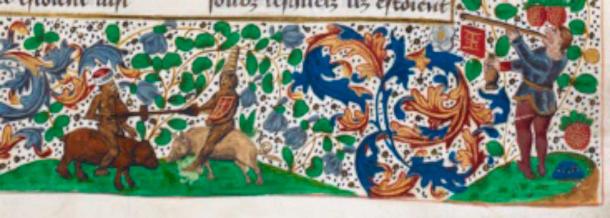
Depiction of medieval marginalia detail showing a herald with a horn on the right, and two monkeys in hats jousting, riding a bear and a pig. (British Museum / CC BY 4.0)
Conclusion
The office of the herald exists to this day in the United Kingdom. We may not see them on the battlefield anymore, declaring victors, but they continue to play an important role in the kinds of ceremonies that keep millions of tourists flooding to the UK every year.
Heralds are a symbol of a very different time. Combat in medieval times was certainly brutal and violent, and not every knight fought with the honor they claimed to have. However, the fact that heralds ultimately decided who won and lost shows how much people valued honor.
We live in an age of misinformation, information wars, and cyber intelligence. Whoever shouts the loudest can declare themselves the winner. In times like this, a herald sounds like a fine idea.
Top image: Heralds acted as messengers on the battlefield. Source: rudall30 / Adobe Stock
By Robbie Mitchell
References
Fox-Davies, A. 1909. A Complete Guide to Heraldry. Dodge Publishing Company
Keegan, J. 1983. The Face of Battle. Penguin Classics.
Scheffer, C. The Early History of Heraldry. The Herald Society. Available at: www.theheraldrysociety.com/articles/topic/early-history-of-heraldry/
Wagner, A. 1953. Heralds and Monarchy. History Today. Available at: https://www.historytoday.com/archive/heralds-and-monarchy



















